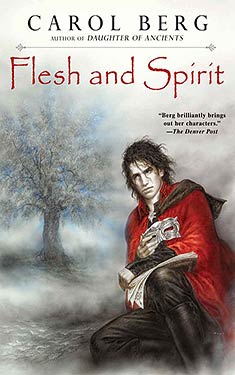Carol Berg
Completed 1/9/2022, Reviewed 1/9/2022
3 star
This book was kind of a mix for me. I thought many of the parts were excellent, the world building, the prose, the characterization, the narration, but as a whole, I found I didn’t care for it. I had a sine wave of interest, liking parts and not finding other parts interesting. The premise is good, a man with the gift for magic hides in a monastery as the world around him seems to be collapsing. The world is getting colder, the harvests are failing, and the sons of the deceased king are at war. There’s even some kind of angels or faeries weaving in and out of the story. Nonetheless, it left me a little cold. This book is part one of a duology that won the 2009 Mythopoeic award.
Valen is a twenty-seven-year-old pureblood, that is, from a family that can wield magic. He’s also a drug addict, self-medicating for a strange affliction which causes him seizures and intense pain. He keeps his identity hidden as he has run away from home and is eking out a life in various ways. The book begins with him being left for dead after running away from the losing side of a battle. He’s found by monks from a monastery who take him in, giving him sanctuary, medical attention, food, and rest. He says he’ll join the order, though he’s only using it as a temporary place to hide from the world. There he finds multiple mysteries. When the war comes to the monastery, he is in danger of being discovered as first, a deserter, and two, as a pureblood. Purebloods need family approval before joining a religious community.
Valen narrates the story, which is interesting because he has a learning disability; he can’t read. Letters are a jumbled mess of inkblots. But he has an amazing memory, which he has developed to help him pass as literate. His character is really well-developed. Besides the illiteracy, he’s the black sheep of his family. He fought his responsibility as a pureblood since childhood. As a result, he was abused by his father and siblings and ignored by his alcoholic mother. He even refused to develop his magical abilities, remembering only how to do the basic divination. He has a book of maps which his crazy grandfather gave him, a book with spells to find hidden places of the Danae, the angel- or faerie-like creatures of this world. He tries to downplay it when he is found by the monks, but the Abbot knows the significance of the book. Valen spends the whole story carefully balancing lies with the truth to stay out of trouble and give himself the ability to hide and split whenever the situation calls for.
The other characters are pretty well-developed as well, particularly some of the monks. The young Jullian is wonderful. He’s twelve, and quite full of insight and passion. When he begins to find out the truths about Valen, he becomes distant and sullen. Valen’s family also shows up later in the story. They are all haughty and antagonistic toward him. You fully get it as you come to know Valen and his past choices.
The world-building is quite amazing. The world is on the brink of collapse. Everyone believes it is the end of times. Two of the three sons of the dead king are warring for the throne. The third, the Bastard Prince, has aligned with the god of the Underworld, mutilating the bodies of the dead soldiers and stealing their eyeballs, which is tantamount to condemning their souls to the hell. There is a mystery pretender to the throne, but we do not get much info about that. It just adds another level to the complexity of the succession. While all this is going on, a radical evangelical group has emerged calling for the purging and purification of anyone who does not worship their particular god. They go about burning and murdering the non-believers, the religious, and the purebloods.
The prose is also exceptional. It is descriptive without being overwhelming. And being told by Valen, it rolls naturally off his tongue. It goes hand in hand with his characterization.
Despite all these positives, I often found the story plodding. It might be because this book is mostly a setup for the second volume. Reading other reviews, people compare it to setting up a chessboard while the important action takes place in the second book. Since both books won the Mythopoeic Award as a duology, I’ll be reading the second as well. I’m hoping that the other reviewers are right. I feel pretty invested in the story and would like to see how it all works out in the end. I give this book three stars out of five.

No comments:
Post a Comment